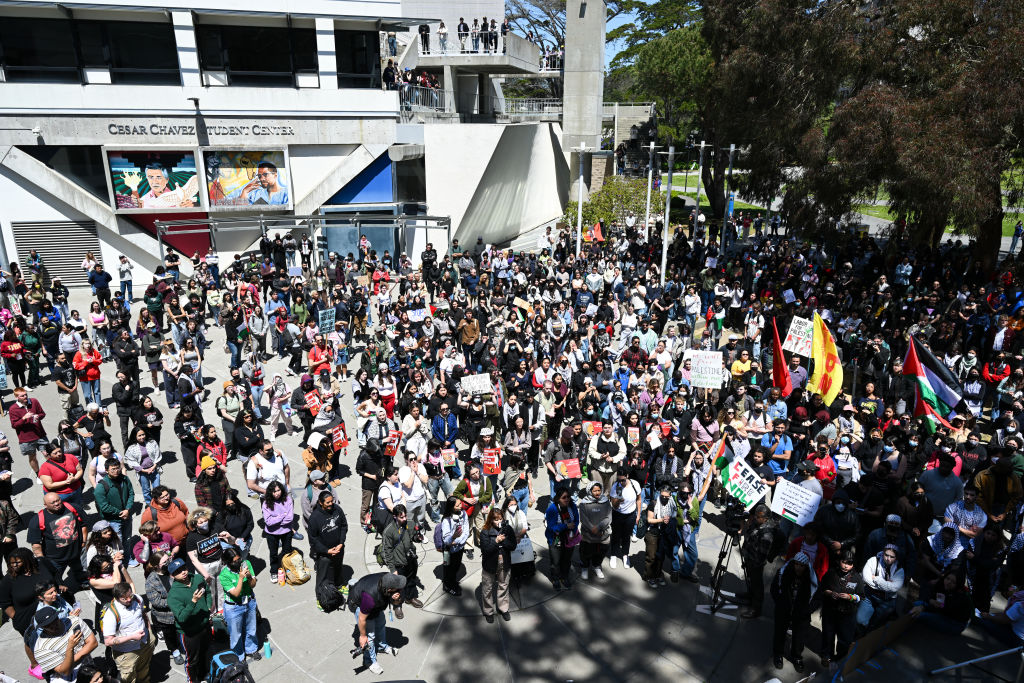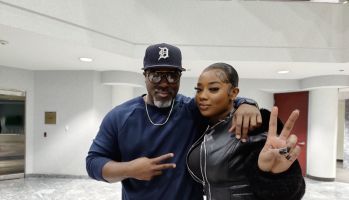
Source: Anadolu / Getty
Across the country, we are seeing protests on college campuses around the treatment of Palestinians in Gaza. Young people are voicing dissent around the more than 34,000 Palestinians killed by Israeli forces over a war they didn’t start. The young demonstrators are being arrested, demonized, and harassed for exercising their constitutional right to question what they see as injustice. While a cursory take is that the protests are about Gaza alone; they’re about democracy – a true democracy without colonization by the American empire abroad and at home.
While we focus on college protests, we should remember two things. First, while Gaza is in our hearts and minds, the campus protests are also about democracy. A functioning democracy requires freedom of speech and freedom to assemble. Next, the absence of campus protests does not signal consent to the attack on democracy or the horrific war in Israel.
What is interesting about this moment is who is not protesting. The campus protests are most occurring at majority-white, private colleges and universities. We aren’t seeing major demonstrations at Historically Black Colleges and Universities (HBCUs). Black students, particularly at state schools, don’t always feel safe to protest due to a history of Black people who suffer disproportionately when they speak up. But that doesn’t mean that Black young people don’t stand in solidarity with their counterparts at larger institutions.
Regardless of where the uprisings are occurring, we cannot lose sight of the tremendous power of protest movements. For instance, this year marks the 60th anniversary of Freedom Summer where Black people and their allies traveled to Mississippi to help secure the vote and bring about a multi-racial democracy. They risked life and limb to challenge injustice; some paid with their lives. On the first day of Freedom Summer, three young people– Andrew Goodman and Michael Schwerner from New York; and James Chaney from Mississippi – went missing, and were later found dead.
While there are multiple reasons for Black people and others to turn away from turbulence, change in the U.S. has only come via resistance. If young people in the 50s, 60s, and 70s, did not resist, many of the privileges that we enjoy today would not exist. Understanding that our very democracy is being eroded before our very eyes, now is the time for us all to engage.
It doesn’t mean that our resistance is welcomed. Recently, the Supreme Court issued a damning ruling on protests in places such as Tennessee, Louisiana and Mississippi. Organizers in these states will question when, how, and where they can exercise their constitutional right to freedom of speech and freedom to assemble. These efforts were not about safety but rather about eliminating dissent.
Additionally, groups that rely on foundations for support are going to carefully consider how they engage in this and similar moments. Many Black leaders and leaders of color are concerned about funders and philanthropists rescinding funding if they step out of line. This comes after a 2023 U.S. Supreme Court ruling ending Affirmative Action in higher education, impacted the philanthropic landscape.
Since the protests on college campuses, we are also seeing billionaires such as Robert Kraft threatening to withhold funding, or withholding funding, when young people morally dissent over the treatment of Palestinians. Grassroots are risking their own existence if they push back on protests. However, it is our constitutional right to do so and change will only happen if we are willing to be uncomfortable and make others uncomfortable.
We are at an inflection point in this country in terms of free speech. At this moment, we should remember that everything that we do in furtherance of democracy is a nod to our ancestors and a downpayment on the future we want for our children and their children.
I get it. The stakes are high. Grassroots groups have a reason to be cautious, but that doesn’t mean that we don’t support this new generation of freedom fighters. In the words of the great abolitionist Frederick Douglass, “This struggle may be a moral one, or it may be a physical one, and it may be both moral and physical, but it must be a struggle. Power concedes nothing without a demand.”
Our ancestors made a demand, and we must too.
Nsombi Lambright-Haynes is the executive director of One Voice in Mississippi and a member of the Black Southern Women’s Collaborative.
SEE ALSO:
Grand Jury Indicts St. Louis Couple Who Brandished Weapons At Peaceful Protesters
The post Silence Is Not Consent: Resistance Is Required Today, Tomorrow And Forever appeared first on NewsOne.
Silence Is Not Consent: Resistance Is Required Today, Tomorrow And Forever was originally published on newsone.com















